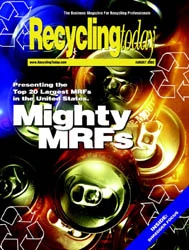Keep Up the Recycling Research
Every business and industry must perform research and development to continue to exist. In such high tech industries as software, pharmaceuticals and biotechnology, the efforts in research are significant and contribute to the growth and dynamics of these sectors. But what about recycling?
End users of the various materials produced from recovered raw materials perform a good level of research. However, when it comes to collection and processing, it’s a different story. This fundamentally important part of closing the loop never seems to get the attention that it deserves. A tremendous amount of the cost of the recycling chain is that of collecting recyclables, and while many small ad-hoc efforts contribute to the overall improvement and state of the art, significant R&D efforts are few and far between.
That’s why we should congratulate some of the major efforts underway by various entities around the country. The state of Minnesota, through its office of Environmental Assistance, is one of the few governmental entities supporting fundamental collection and processing research by a public entity. Their current project, "Improving Recycling of Residential Paper," is an example of a research effort that is examining the impact of public education on recovery levels in a series of Minnesota cities.
In the private sector, collector/processor, Waste Management Inc., Houston, is one of the few companies in this sector devoting time and effort to improving the pickup and processing of recyclables. In the solid waste industry, much of the recycling collection programs that exist now are similar to the way garbage was picked up in the early 1950s; open bin trucks with no compaction. While many feel that Waste Management’s move to single-stream recycling may not be the way to go in their local community, we applaud the company’s efforts investigating and optimizing the collection of recyclables.
On the intermediate processing side, a truly high-tech approach is being developed. Weyerhaeuser, Federal Way, Wash., and MSS Inc., Nashville, Tenn., are combining their efforts to develop their PaperSort processing technology. This truly high-tech approach to advanced automated paper grade sorting has the potential to revolutionize the very low-tech, currently widely used "10-finger technology" (hand sorting).
Although there are no statistics available on recycling industry collection or processing R&D costs, if there were they would pale by comparison to other business sectors. Hopefully, we are on the verge of applying more R&D to this important piece of the recycling effort.
– Bill Moore,
Moore & Associates, Atlanta

Explore the August 2002 Issue
Check out more from this issue and find your next story to read.
Latest from Recycling Today
- Athens Services terminates contract with San Marino, California
- Partners develop specialty response vehicles for LIB fires
- Sonoco cites OCC shortage for price hike in Europe
- British Steel mill’s future up in the air
- Tomra applies GAINnext AI technology to upgrade wrought aluminum scrap
- Redwood Materials partners with Isuzu Commercial Truck
- The push for more supply
- ReMA PSI Chapter adds 7 members





